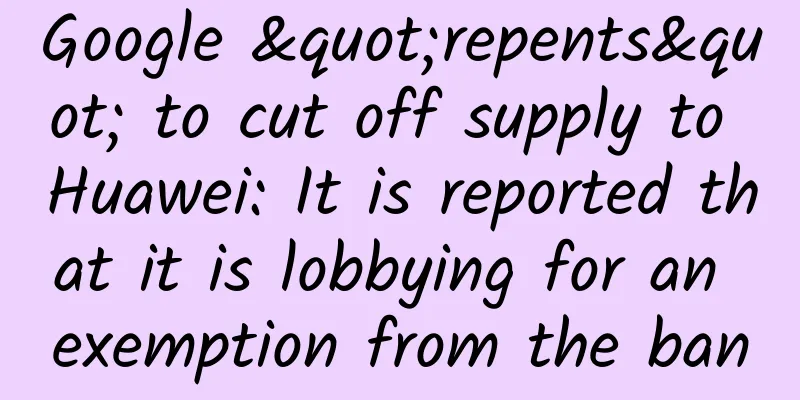Google "repents" to cut off supply to Huawei: It is reported that it is lobbying for an exemption from the ban

|
This article is reprinted with permission from AI new media Quantum Bit (public account ID: QbitAI). Please contact the source for reprinting. The righteous will have many supporters. Things are changing again. The latest news on June 8 is that Google officials are working to extend or completely exempt Huawei. The Financial Times quoted sources as saying that Google is lobbying the Trump administration for a further delay in the implementation of its export ban on Huawei, or even a complete exemption. What's more, the reason given by Google is even more ironic. If Huawei is not allowed to get the latest Android updates, it will be more likely to cause security risks. Although on May 20, it was Trump's ban on the grounds of "security risks" that led Google to cut off supplies to Huawei, claiming that the official Android and Google family would no longer support Huawei phones. But obviously, Google has "repented" now - especially in the face of wave after wave of clear reversals. Google "repents" The Financial Times reported that Google executives are launching a new lobbying campaign against the Trump administration with the goal of extending its license to cooperate with Huawei or even completely exempting it from the ban. The most direct reason is that Huawei phones that do not use official Android are more likely to be hacked and are more likely to have security risks.
Of course, the more important reason behind this is the concern that the ban on Huawei will further affect Google's other businesses. On May 20, Google officially admitted that it would implement Trump's ban and cut off the supply of official Android and Google services to Huawei. This means that Huawei will not be able to get the latest Android updates, and its overseas mobile phone business is also facing the risk of being "crippled". Although Trump later extended the implementation for another 90 days, the bottleneck crisis has not been resolved. Without official Android support, Huawei phones only have the open source version to choose from. However, compared with the official Android version, there is a big difference in both performance experience and security risks. Even so, Huawei was not defeated. Huawei's "backup" system Hongmeng quickly surfaced. Google executives also claimed during the lobbying that was exposed that the ban would prompt Huawei to develop and launch its own operating system. But the most important thing is that Google said that once Huawei cannot get the official Android version, the security risks of Huawei phones in the United States or in other parts of the world will only double. This contradicts Trump's reason for the ban - security reasons. Google did not respond further, but gave the following statement to the media:
Previously, Singaporean media also reported that although Google was the first to cut off supplies to Huawei, compromise was also taking place in secret. Huawei Mate 20 Pro is back on the list of manufacturers supporting Google's latest Android version, Android Q, which means Google has re-included this Huawei phone in the Android Q test series. The whole story Google is one of the first American companies to take action against Huawei. On May 15, Trump signed an executive order requiring the United States to enter a state of emergency and prohibiting American companies from using telecommunications equipment produced by companies that pose a risk to national security. Also on May 15, the US Department of Commerce added Huawei to the "Entity List", requiring all US companies to obtain government permission before exporting products to Huawei.
Subsequently, Google was exposed to cut off supply to Huawei in terms of hardware, software and technical services, including its smartphone operating system: Android. Most directly, Huawei will lose access to updates to Google's Android operating system. Only the open source version can be used. Applications and services such as the Google Play Store, Gmail, Maps, and YouTube will no longer be available. Going forward, Huawei will only be able to use the public version of Android, without access to Google's proprietary apps and services. After the news was exposed by the media on May 20, it was officially confirmed by Google. In response to this news, Huawei issued a statement saying:
Huawei's response was not just a statement. After Google announced that it would stop supplying Huawei, Yu Chengdong further revealed the details of Huawei's self-developed system, including the launch time and software ecosystem that the outside world is concerned about: In terms of timing, the new operating system will be available at the earliest this fall and at the latest next spring. In terms of functional features, it connects mobile phones, computers, tablets, TVs, cars, smart wearable devices, and is also compatible with all existing Android applications and Web applications. The transition period given to Huawei by the United States will expire on August 19. On May 20, the US Department of Commerce issued a 90-day "temporary general license" to postpone the trade ban on Huawei and its affiliates. This measure will take effect from May 20th and last until August 19th. That is to say, by then Google will not be able to provide relevant services to Huawei. Just recently, the Global Times reported that Huawei is focusing on testing its own operating system, which is named "Hongmeng OS" in the domestic market and "Ark OS" in overseas markets. This system may be launched in August or September.
Now, things are taking a turn for the better. What do you think after the turnaround? After this news was exposed, it sparked widespread discussion. Why did Google do this? Many netizens believe that when using "national security" to explain the issue, it is not right to use Huawei, and it is not right not to use Huawei. They are truly "logical geniuses" and their reasons are very "fresh and unconventional." In their view, the reason behind this is that Google is afraid that some companies will use the Android system to create services that compete with its own. Because Huawei will bring its own operating system and Android will lose market share as a result. Some netizens even went so far as to settle the score with Google:
In the view of some American netizens, Google made this change too late. Huawei and others have been planning to diverge from Android for years, and the ban simply motivates them to speed up the process. Some netizens also believe that even if the United States relaxes sanctions now, it cannot change the path of self-research and self-reliance. There is no going back, do you understand? Reversal of the tide Google’s “repentance” and reversal is also a microcosm of the current situation. Within half a month, many companies and organizations experienced a drama of "supply cut" to "restoration". For example, industry organizations such as the SD Memory Card Association, the Wi-Fi Alliance, the Bluetooth Technology Alliance, and the JEDEC Association first implemented a ban and excluded Huawei, but recently all of them were restored. There is also the IEEE, the world's largest academic organization, which initially ordered a purge of Huawei reviewers and editors. However, after arousing strong protests and politicized criticism from the academic community, it has just announced that all Huawei's legitimate rights and interests will be restored. Some companies caught up in the rumors made their position clear with another statement. Germany's Infineon, Japan's Panasonic, Japan's Toshiba and others have issued announcements claiming that they will not cut off supplies to Huawei. TSMC's chairman Liu Deyin even directly stated that the US government's ban on Huawei is not positive for the global semiconductor industry, and TSMC will continue to ship to Huawei. As for ARM, the British semiconductor company owned by Masayoshi Son, although it has implemented a ban to cut off supplies to Huawei, it is still having an easy time.
ARM co-founder Hermann Hauser was fierce in his assessment of the consequences. He believes that it will harm Huawei in the short term, but in the long run, it will also cause serious harm to ARM and other companies that implement the ban. Some even believe that after this incident, European companies will have to rethink their relationship with the United States and American intellectual property. ARM's latest official statement said that it attaches great importance to the relationship with its long-term partner Huawei HiSilicon and hopes to resolve the current difficulties quickly. As the saying goes, those who are in the right will have many supporters, while those who are in the wrong will have few .
In China, Huawei has recently gained more cooperation. China Post and Tsinghua University have joined hands with Huawei to start cooperation, and Suning and others have also been reported to be in cooperation talks. Huawei has surpassed Apple in its latest shipments and sales performance, becoming the world's second largest mobile phone manufacturer. Well, a blacksmith must rely on his own strength, and self-reliance is the key to success. |
<<: iOS 13's new feature "Apple Login" is mandatory and sparks controversy
>>: Understand these three reasons that slow down mobile applications before solving the problem
Recommend
Summary of the channel characteristics of advertising on Momo, iQiyi, Kuaishou, etc.!
What are the characteristics of information flow ...
Silicon Valley Guide: How to systematically improve user retention?
Pinterest is one of the most popular social platf...
Silverware is loved by many people, what is its charm?
In ancient my country, only prominent families su...
Jiangsu notifies teachers and staff to return to school and work: When can they return to work? When can students return to school?
As the number of confirmed cases of the epidemic ...
What would you see if you dismantled 300 nuclear power plants?
2022 The world's first artificial nuclear rea...
Have you encountered these bugs in the official version of iOS/iPadOS 14?
The official version of iOS/iPadOS 14 has been re...
How to use data analysis to drive user growth?
Using data to gain insight into users and underst...
In-depth case study: Accurately outline user portraits and build an efficient financial customer analysis system from 0 to 1
With the gradual entry of foreign banks into the ...
iOS WeChat 8.0.14 official version released, adding four new features
The official WeChat team pushed the latest offici...
How did the young man regain the lost skill of Gaolou Rice Noodles? How to do it?
Young man regains lost skill of high-rise rice no...
What are the Baidu bidding keyword selection techniques?
(1). Keyword selection can be based on the follow...
Meituan Takeout’s ranking cannot be improved. How can we check the ranking of Meituan Takeout?
For SEO optimizers, many platforms can be optimiz...
Unveiling the magic of Amazon: What did Bezos do behind the miracle of low profits and high valuations?
Lishi Introduction: Since its listing in 1997, Am...
Which type of promotion is more effective: paid promotion, free promotion, or social media promotion?
When farming on the Internet, traffic is like the...
Advanced Negotiation Practice Course: Creating a Third Choice and Achieving a Win-Win Relationship
Course Catalog 01. Why should we focus on the &qu...







![Toutiao News Feed Advertising Optimization [Practical Tips] Tutorial](/upload/images/67cc4ecbe2b7e.webp)

